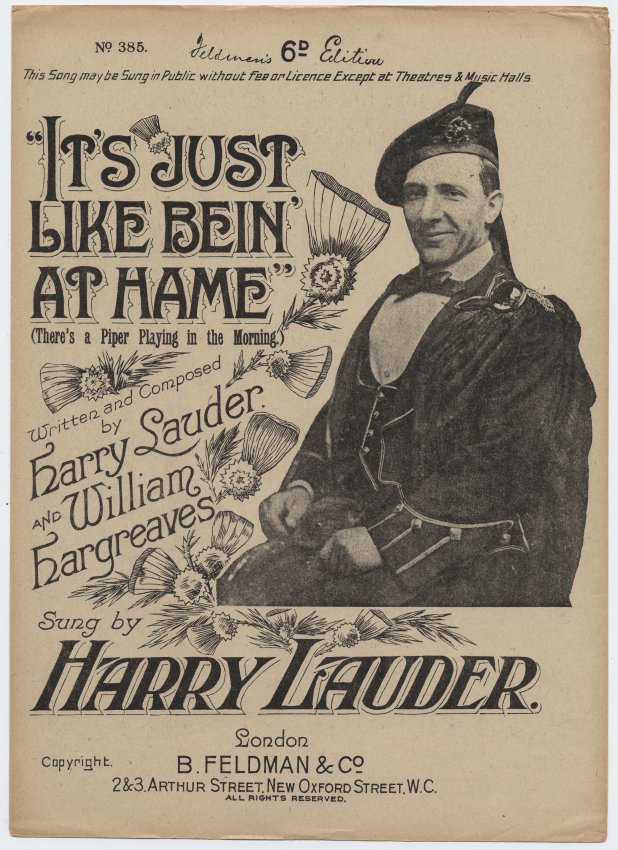Just like bein’ at hame
This song reflects racist, misogynist and colonial ideas that were commonplace at the time but are no longer acceptable today.
| AKA | Just like being at home There’s a piper playing in the morning |
| First Published | 1910 |
| Writer/composer | Harry Lauder and William Hargreaves | Roud | RN43188 |
| Music Hall Performers | Harry Lauder |
| Folk performances | Collected from the singing of: Weir, Tom; Canada : Ontario; 1964 |
It's just like bein' at hame (There's a piper playing in the morning) [From sheet music] A Highland regiment was forced to start, To a distant land across the foam; Whilst a poor old mither, with a heavy heart, Waited anxiously at home. Soon her sad face turned into a smiling one, When a letter came from across the sea For it said "Don't cry! Don't you sigh! I'm as happy as can be": There's a piper playing in the morning, An auld Scotch tune so fine There's a tartan pladdie buckled on each laddie Oh it's just like Auld Lang Syne. I can hear them praising Bonnie Scotland, Bonnie Scotland's fame, So don't sigh dear, Am a'richt here It's just like being at hame. The fierce fight lengthened and the months dragged on, Whilst the roll call shorten'd every day; Though they saw their comrades falling, one by one Yet they bravely fought their way; For the handful left had sworn to do or die, And with one long cheer they forged ahead; And a Highland lad fought like mad, As mither proudly read: The flag was planted beneath the scorching sun, Where the white man's rule will ever reign; And the brave Scots soldiers who had fought and won Were returning home again. And the Highland mither watched the passing ranks For the face of one she loved so dear, And in frenzied joy, kissed her boy, As he whispered in her ear:

Harry Lauder wrote and performed a number of songs in praise of the armed forces, particularly during World War I.
Its possible that this earlier song, from around 1910, was written in response to the latest conflict at what the British called the “North West Frontier”: The Bazar Valley Campaign of 1908. On the other hand it may well just be another generic Music Hall song in praise of soldiers fighting for Empire – there were plenty! (For other examples see Song Theme: Emigration and empire)
Lauder’s martial songs of empire seem to have been less likely to have entered the repertoire of traditional singers, but this one did. It was collected from the singing of a Canadian traditional singer Tom Weir by Edith Fowke in 1964.
Sources:
- Entries in the Roud Indexes at the Vaughn Williams Memorial Library: https://archives.vwml.org/search/all:single[folksong-broadside-books]/0_50/all/score_desc/extended-roudNo_tr%3A43188
- Kilgarrif Sing Us
- Lyrics and Sheet Music: Irish Sheet Music Archive